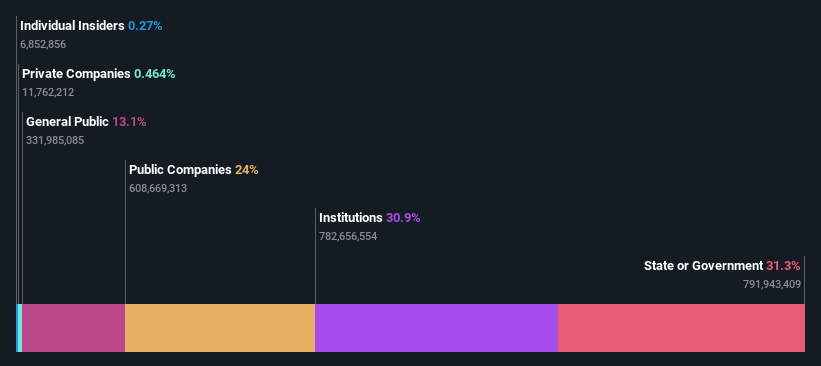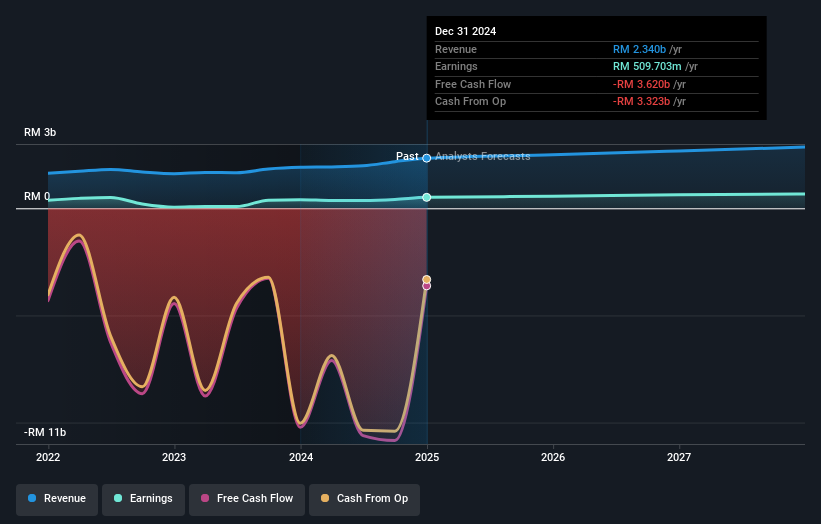AFFIN Bank Berhad (KLSE:AFFIN) surges 4.2%; state or government who own 31% shares profited along with institutions

Key Insights
- AFFIN Bank Berhad's significant state or government ownership suggests that the key decisions are influenced by shareholders from the larger public
- The top 2 shareholders own 55% of the company
- 31% of AFFIN Bank Berhad is held by Institutions
A look at the shareholders of AFFIN Bank Berhad (KLSE:AFFIN) can tell us which group is most powerful. We can see that state or government own the lion's share in the company with 31% ownership. In other words, the group stands to gain the most (or lose the most) from their investment into the company.
State or government gained the most after market cap touched RM6.9b last week, while institutions who own 31% also benefitted.
Let's delve deeper into each type of owner of AFFIN Bank Berhad, beginning with the chart below.
See our latest analysis for AFFIN Bank Berhad

What Does The Institutional Ownership Tell Us About AFFIN Bank Berhad?
Institutional investors commonly compare their own returns to the returns of a commonly followed index. So they generally do consider buying larger companies that are included in the relevant benchmark index.
AFFIN Bank Berhad already has institutions on the share registry. Indeed, they own a respectable stake in the company. This suggests some credibility amongst professional investors. But we can't rely on that fact alone since institutions make bad investments sometimes, just like everyone does. When multiple institutions own a stock, there's always a risk that they are in a 'crowded trade'. When such a trade goes wrong, multiple parties may compete to sell stock fast. This risk is higher in a company without a history of growth. You can see AFFIN Bank Berhad's historic earnings and revenue below, but keep in mind there's always more to the story.

We note that hedge funds don't have a meaningful investment in AFFIN Bank Berhad. Looking at our data, we can see that the largest shareholder is State Financial Secretary with 31% of shares outstanding. The Bank of East Asia, Limited is the second largest shareholder owning 24% of common stock, and Lembaga Tabung Angkatan Tentera holds about 22% of the company stock.
A more detailed study of the shareholder registry showed us that 2 of the top shareholders have a considerable amount of ownership in the company, via their 55% stake.
While studying institutional ownership for a company can add value to your research, it is also a good practice to research analyst recommendations to get a deeper understand of a stock's expected performance. Quite a few analysts cover the stock, so you could look into forecast growth quite easily.
Insider Ownership Of AFFIN Bank Berhad
The definition of company insiders can be subjective and does vary between jurisdictions. Our data reflects individual insiders, capturing board members at the very least. The company management answer to the board and the latter should represent the interests of shareholders. Notably, sometimes top-level managers are on the board themselves.
Most consider insider ownership a positive because it can indicate the board is well aligned with other shareholders. However, on some occasions too much power is concentrated within this group.
Our information suggests that AFFIN Bank Berhad insiders own under 1% of the company. It's a big company, so even a small proportional interest can create alignment between the board and shareholders. In this case insiders own RM19m worth of shares. It is good to see board members owning shares, but it might be worth checking if those insiders have been buying.
General Public Ownership
The general public, who are usually individual investors, hold a 13% stake in AFFIN Bank Berhad. This size of ownership, while considerable, may not be enough to change company policy if the decision is not in sync with other large shareholders.
Public Company Ownership
It appears to us that public companies own 24% of AFFIN Bank Berhad. This may be a strategic interest and the two companies may have related business interests. It could be that they have de-merged. This holding is probably worth investigating further.
Next Steps:
It's always worth thinking about the different groups who own shares in a company. But to understand AFFIN Bank Berhad better, we need to consider many other factors.
I always like to check for a history of revenue growth. You can too, by accessing this free chart of historic revenue and earnings in this detailed graph.
Ultimately the future is most important. You can access this free report on analyst forecasts for the company.
NB: Figures in this article are calculated using data from the last twelve months, which refer to the 12-month period ending on the last date of the month the financial statement is dated. This may not be consistent with full year annual report figures.
New: Manage All Your Stock Portfolios in One Place
We've created the ultimate portfolio companion for stock investors, and it's free.
• Connect an unlimited number of Portfolios and see your total in one currency
• Be alerted to new Warning Signs or Risks via email or mobile
• Track the Fair Value of your stocks
Have feedback on this article? Concerned about the content? Get in touch with us directly. Alternatively, email editorial-team (at) simplywallst.com.
This article by Simply Wall St is general in nature. We provide commentary based on historical data and analyst forecasts only using an unbiased methodology and our articles are not intended to be financial advice. It does not constitute a recommendation to buy or sell any stock, and does not take account of your objectives, or your financial situation. We aim to bring you long-term focused analysis driven by fundamental data. Note that our analysis may not factor in the latest price-sensitive company announcements or qualitative material. Simply Wall St has no position in any stocks mentioned.
About KLSE:AFFIN
AFFIN Bank Berhad
A financial holding company, provides various banking services in Malaysia.
Solid track record with adequate balance sheet.
Similar Companies
Market Insights
Community Narratives




